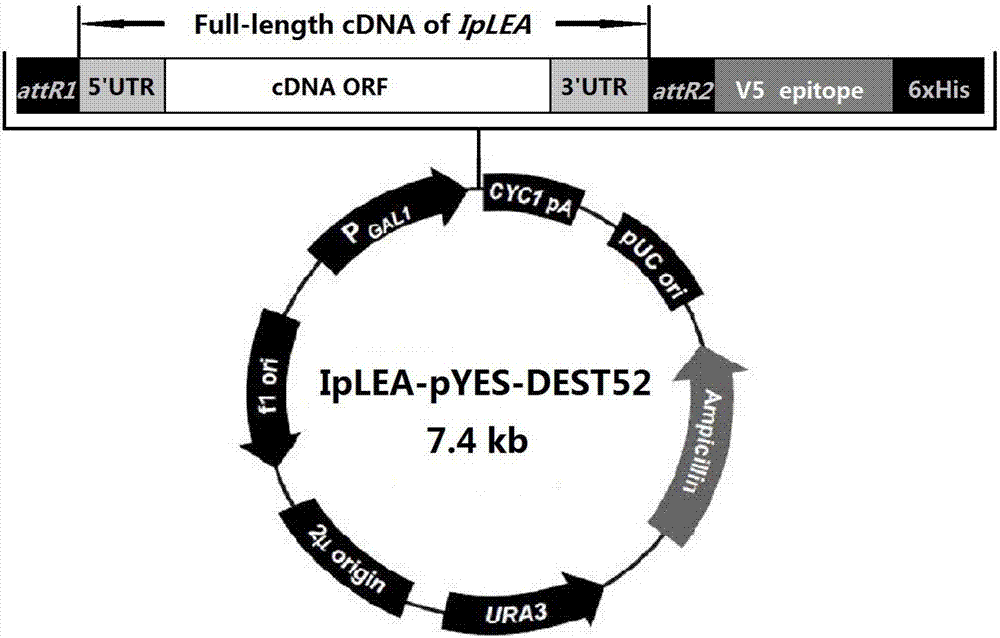Ipomoea pes-caprae IpLEA gene, coding protein and application thereof
A gene and protein technology, applied in the field of biological genetic engineering, can solve problems that need to be developed
- Summary
- Abstract
- Description
- Claims
- Application Information
AI Technical Summary
Problems solved by technology
Method used
Image
Examples
Embodiment 1
[0039] Example 1: Obtaining the full-length cDNA of the abundant protein gene IpLEA in the late embryogenesis stage of the Achilles vine cDNA through screening the yeast expression library
[0040] 1.1 Construction of the full-length cDNA expression library of Houteng
[0041] The construction of the thick rattan cDNA library mainly refers to the instruction manual of CloneMiner II cDNA Library Construction Kit, using (Invitrogen) technology. Specifically, the method comprises the following steps: extraction of total RNA, separation of mRNA, construction of a primary cDNA library and construction of a secondary cDNA library. The main steps are summarized as follows:
[0042] (1) Total RNA extraction
[0043] Take 2 g of the same amount of thick vine leaves, leaf buds, vines and young roots, grind them into powder with liquid nitrogen in a pre-cooled mortar, transfer the powder to multiple RNase-free 1.5mL centrifuge tubes, each centrifuge tube Add 1mL Trizol Reagent, shak...
Embodiment 2
[0061] Example 2: Overexpression of IpLEA gene in yeast improves salt tolerance and tolerance to oxidative stress of yeast
[0062] 2.1 Yeast strain transformed with IpLEA-pYES-DEST 52
[0063] Adjust the concentration of the IpLEA-pYES-DEST 52 recombinant plasmid verified by the sequencing results to 0.1 μg / μL, and use the lithium acetate method to transform the yeast salt-sensitive mutant strain AXT3 and the corresponding wild-type yeast strain W303, and transform Yeast to H 2 o 2 Sensitive mutants yap1Δ and skn7Δ and corresponding wild-type yeast strain WT. At the same time, the yeast expression vector empty vector pYES2 was used as a control, and the above yeast strains were transformed respectively.
[0064] 2.2 The expression of IpLEA gene in yeast salt-sensitive mutant strain AXT3 and wild-type strain W303 can improve the salt tolerance of transgenic yeast
[0065] Pick the single clone of the yeast strain AXT3 transformed into the empty vector pYES2 and the IpLEA g...
Embodiment 3
[0079] Example 3: Overexpression of IpLEA gene in Escherichia coli improves the salt tolerance and dehydration tolerance of Escherichia coli
[0080] 3.1 Construction of Escherichia coli recombinant protein expression vector IpLEA-pGEX 6p-1
[0081] Using the yeast expression vector pYES-DEST 52 recombinant plasmid containing the cDNA of the abundant protein gene cDNA of the late embryogenesis of A. spp. The full-length cDNA reading frame of the gene. For the PCR system used, refer to the instruction manual of PrimeSTAR HS DNA Polymerase with GC Buffer from TaKaRa Company. The amplified DNA fragments were used according to the instructions of HiPure Gel Pure DNA Kits from Magen Company. The recovered fragment was used for insertion into the Escherichia coli recombinant protein expression vector pGEX 6p-1. The pGEX 6p-1 plasmid was digested with BamHI, and the linearized plasmid was recovered. The cDNA reading frame PCR fragment of recovered IpLEA and the linearized pGEX6p-...
PUM
 Login to View More
Login to View More Abstract
Description
Claims
Application Information
 Login to View More
Login to View More - R&D
- Intellectual Property
- Life Sciences
- Materials
- Tech Scout
- Unparalleled Data Quality
- Higher Quality Content
- 60% Fewer Hallucinations
Browse by: Latest US Patents, China's latest patents, Technical Efficacy Thesaurus, Application Domain, Technology Topic, Popular Technical Reports.
© 2025 PatSnap. All rights reserved.Legal|Privacy policy|Modern Slavery Act Transparency Statement|Sitemap|About US| Contact US: help@patsnap.com



